A good steak dinner is synonymous with celebration and achievement. From the world's most popular restaurants to your backyard grill, there are few foods as quintessentially American as steak. While plant-based products continue to flood the market, there will never quite be an equal substitute for old-fashioned quality beef.
Red meat has taken some heat of late, though, and we don't just mean in the broiler. Steak has borne some of the blame for global warming, and the industry's been accused of inhumane practices. It's been called a carcinogen and contributor to heart disease, despite the fact that most studies linking red meat and health risks have been observational ones, which do not provide causation. We asked two experts, Tristan Phillips, a strength and movement coach, and Patrick Montgomery, CEO and owner of KC Cattle Company, to weigh in on the healthiest cuts of steak.
"It has long since been proven that dietary cholesterol from lean red meats does not raise cholesterol and heart disease risk," says Tristan Phillips, who references a study from the American Journal of Clinical Nutrition and one from Harvard Health Publishing. Another study by the group reported that diets that included lean cuts of red meat actually helped reduce cholesterol. And as a whole, "Red meat is among the most nutrient-dense foods on the planet, with an impressive amount of bio-available nutrients," says Phillips.
"So much of what is ideal for your diet depends on your genetic makeup and what diet you are striving to complete," says Patrick Montgomery. "If you're striving for a diet with one splurge of red meat per week, I would recommend filet mignon because it is lean and delicious."
Clearly, the good news is that there's plenty of support that, in moderation, steak is still great. Even better now, as a matter of fact, as the cattle-farming industry has risen to these challenges to offer us more and improved options, like grass-fed and grass-finished. Plus, choosing Prime rather than Choice or Select, keeps you on the lower fat range while you enjoy your favorite cut.
Knowing your supplier also helps you get the best bang for your buck. Montgomery cautions that "monitoring of claims of grass-fed, pasture-raised, etc. is minimal. Find a rancher that raises a healthy herd—it's going to be a better, healthier steak." Phillips agrees, saying "The least healthy steak is always one from a cow raised in the worst possible conditions, like an industrialized feedlot."
As you seek out your chosen reputable source of beef, here are the healthiest cuts of steak, ranked by calorie content, fat content, and overall taste, along with some tips on how to make them healthier.
Ribeye Steak
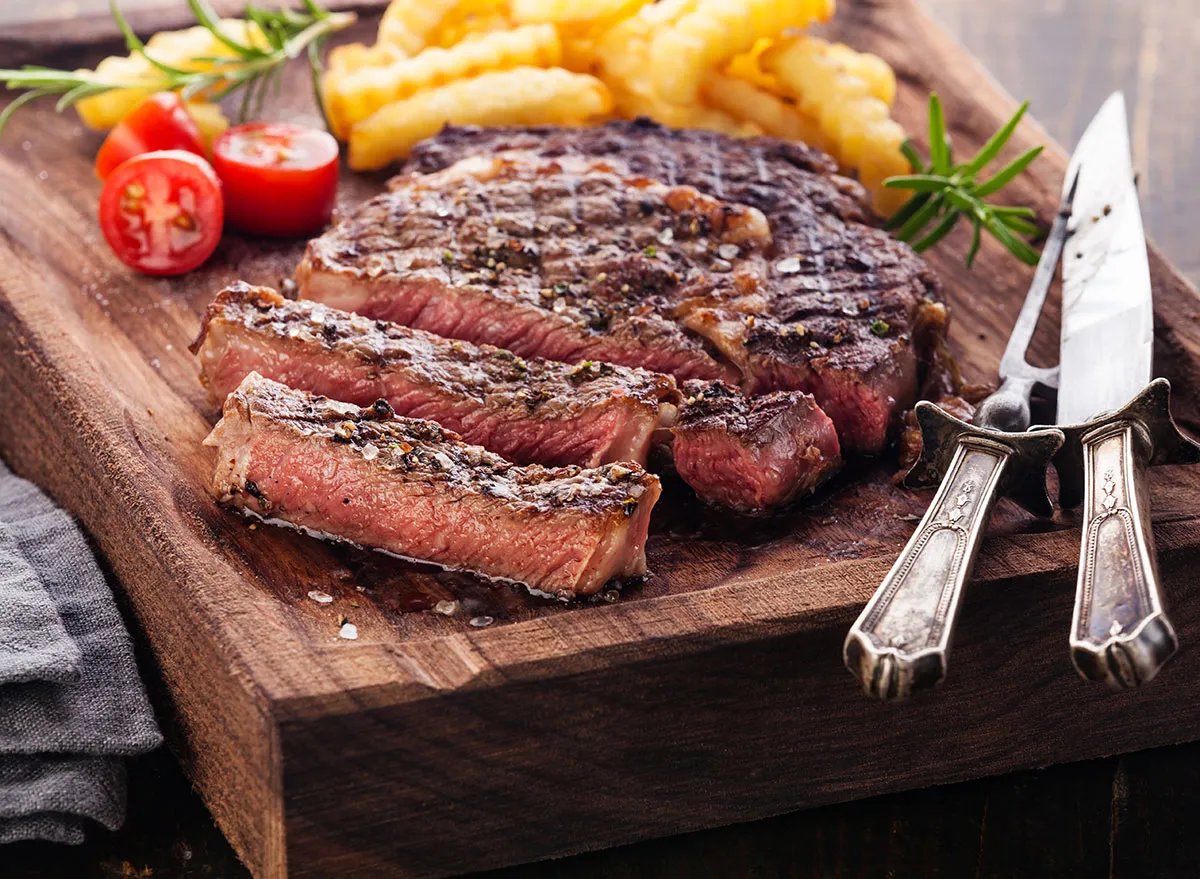
Of course, the tastiest, most luxuriously decadent steak of all is the worst one for you. This is the show-stopping cut that is called a Tomahawk when it's served on the bone, and prime rib when it's prepared as a dramatic standing rib roast. No matter how you slice it, it's gorgeously marbled with fat, which is what makes it so rich-tasting and juicy. Unfortunately, that's exactly why it ranks dead last. Sure, not too much of it is saturated, but the overall quantity is a doozy. However, "if you're eating keto, that's probably right up your alley," Montgomery says. Otherwise, you should probably share this one.
Chuck Eye/Delmonico Delmonico
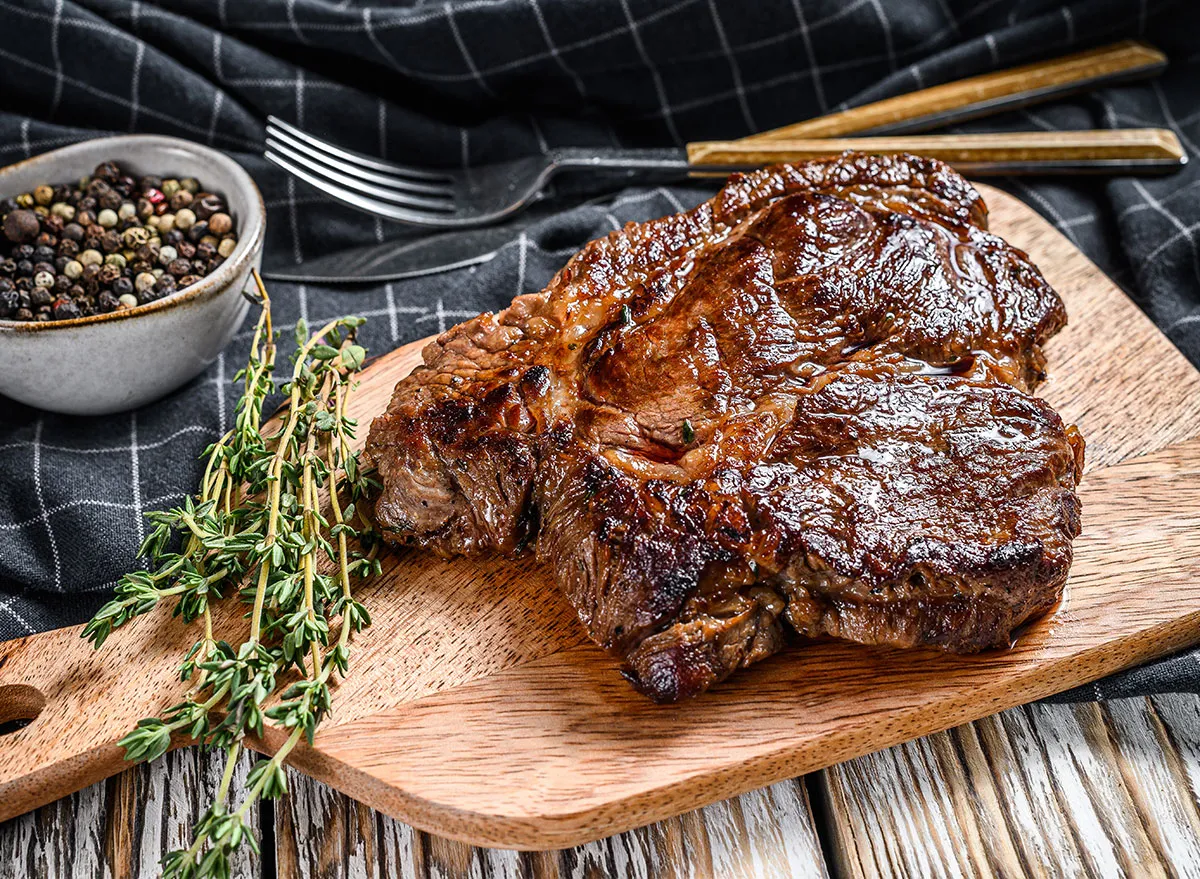
On a low-carb diet, high fat is a good thing. It keeps you full and satisfied, and therefore closer to your goals. However, this cut pairs high fat with a high amount of saturated fat, plus more cholesterol than the one it's called a "poor man's" version of: the sinfully delicious ribeye. This does make it appropriate for keto but be warned that that's not a program meant to be sustained over long periods of time.
Denver Steak
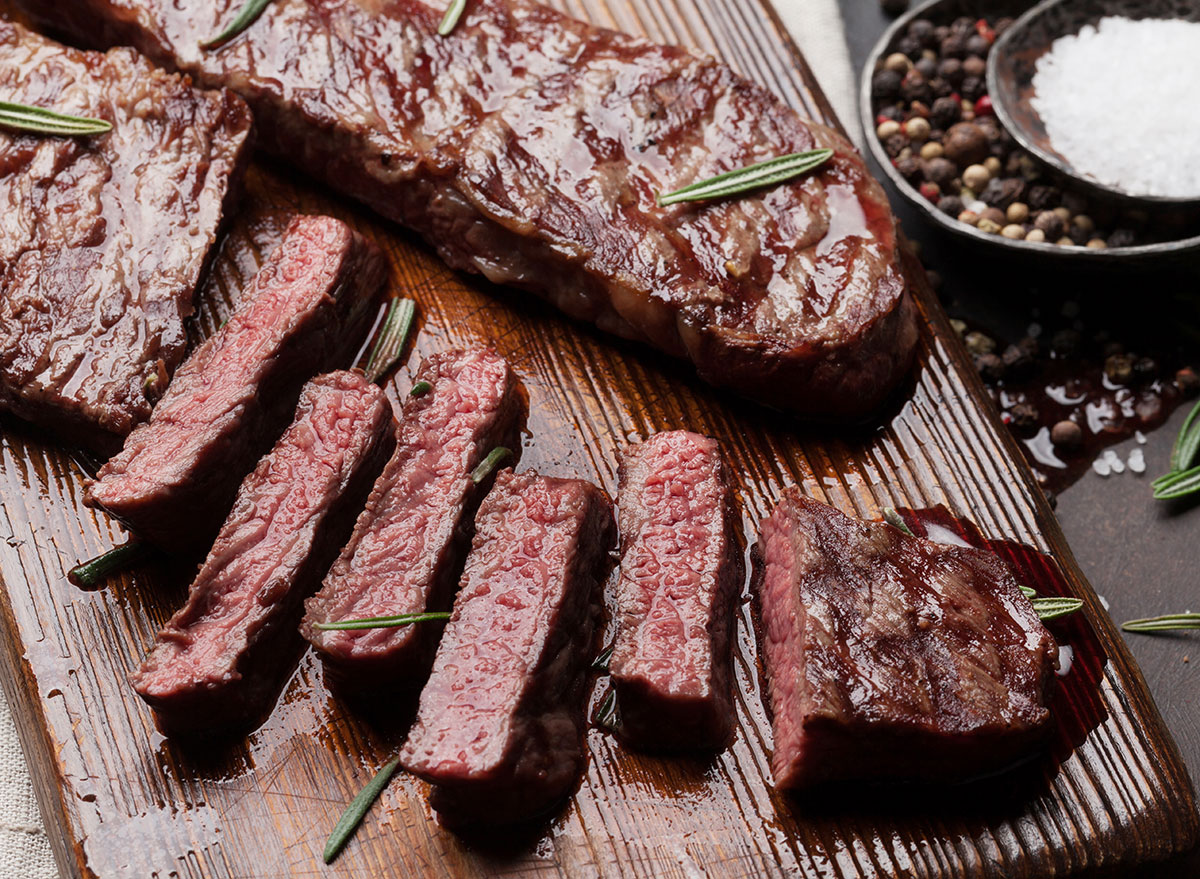
This lesser-known cut is taken from the chuck section, which is near the shoulder and known for its beefy, full flavor. Like the ribeye, this type of steak is well-marbled, which is what makes it tastier but less healthy. While the Denver is considerably lower in overall fat, a higher percentage of it is saturated, yielding nearly half a gram more fat per serving than its more famous cousin and one gram less of protein.
New York Strip Steak
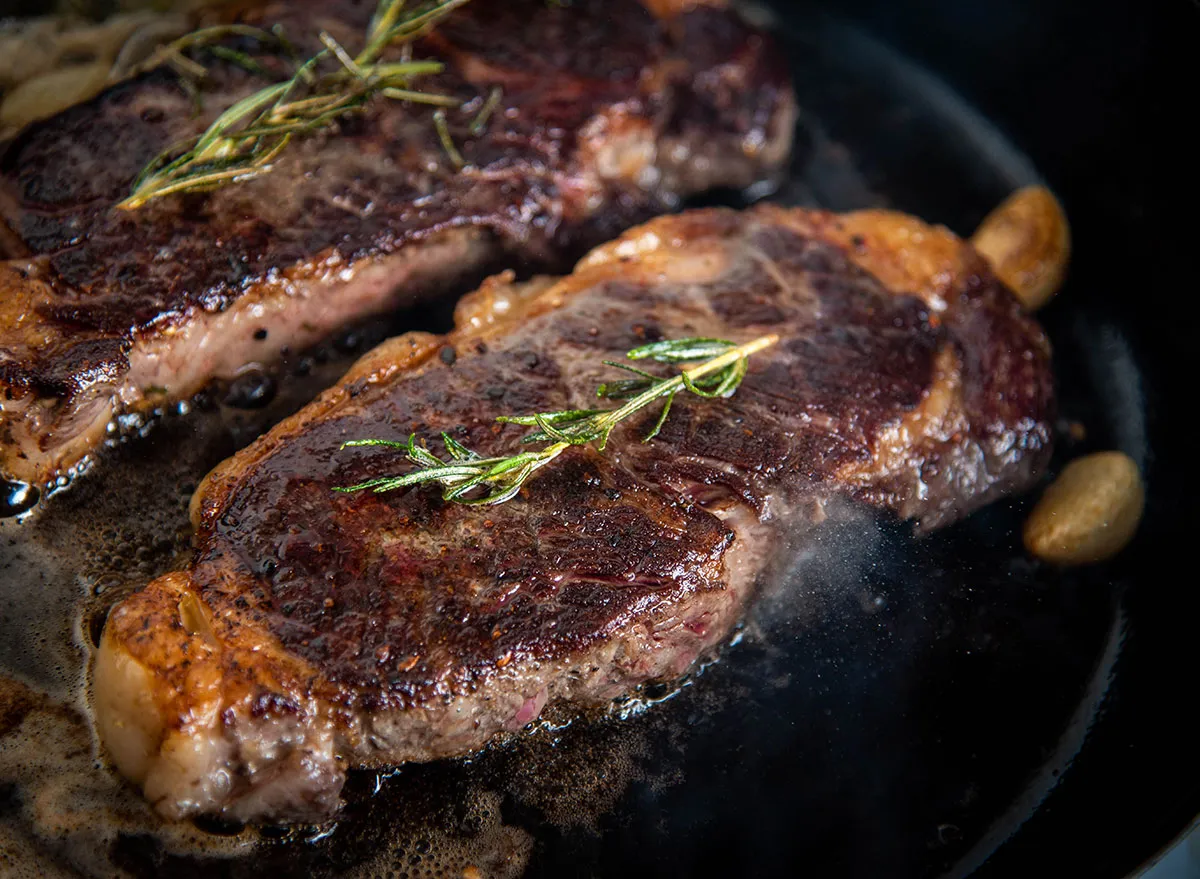
Also known as a Kansas City steak, a Hotel-Style steak, top loin, and at supermarkets, a shell steak, the strip is one of the most loved and most ordered at fine steakhouses. It has a robust, buttery flavor to it and is Phillips' cut of choice. "With a flick of a knife, it can be a lean cut or fatty one. If you want to make it leaner, cut off the strip of fat on the edge," he advises. This single action is actually all it takes to drop 40 calories and half the saturated fat, bumping this up to as nearly a healthy profile as even a filet mignon!
T-Bone & Porterhouse Steaks
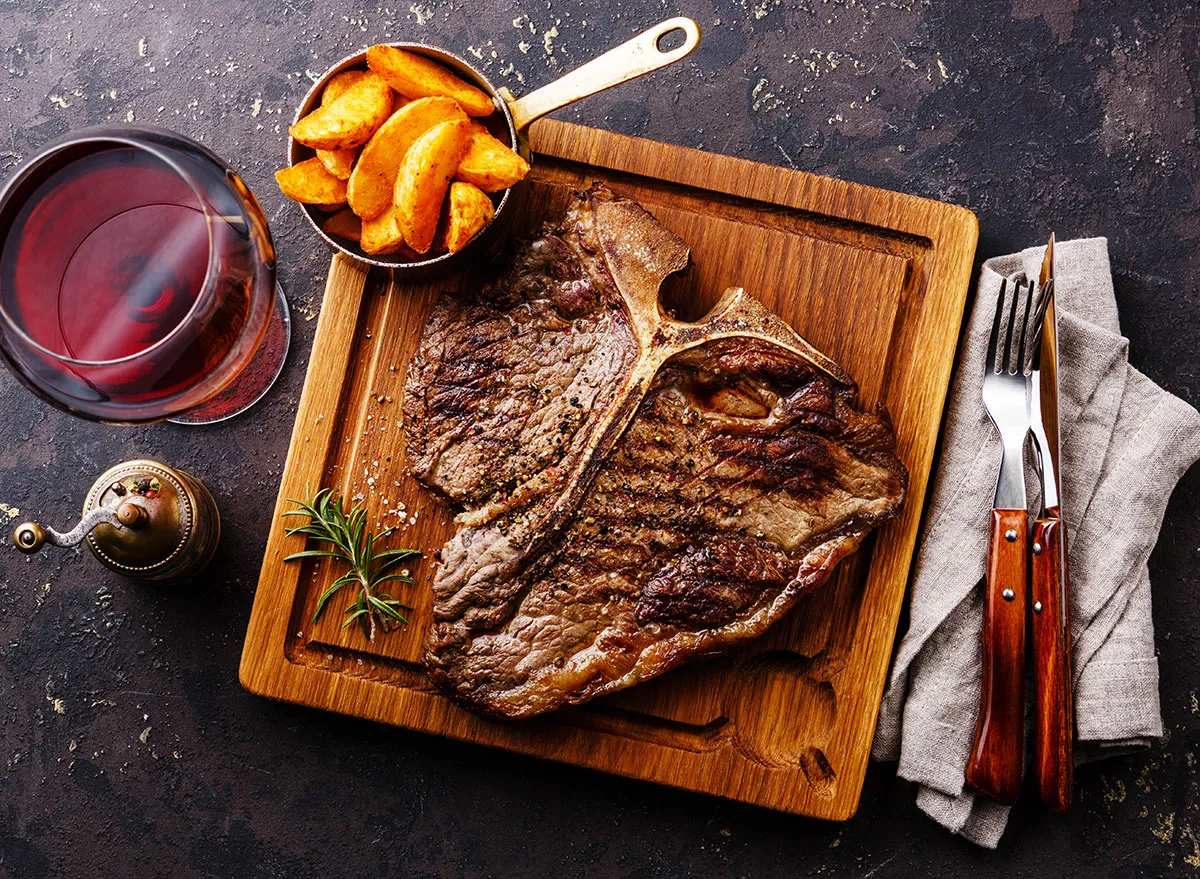
From the loin comes some of the most tender and well-known cuts, including these two bone-in steakhouse favorites. The Porterhouse is also known as a King Steak and it tastes like one, with its bigger signature 'T' dividing a New York Strip and filet mignon. The main differences between these two are portion size and location. The T-bone is taken from toward the front and has a smaller tenderloin section and therefore a smidge less of the leaner meat per ounce.
Flat Iron Steak
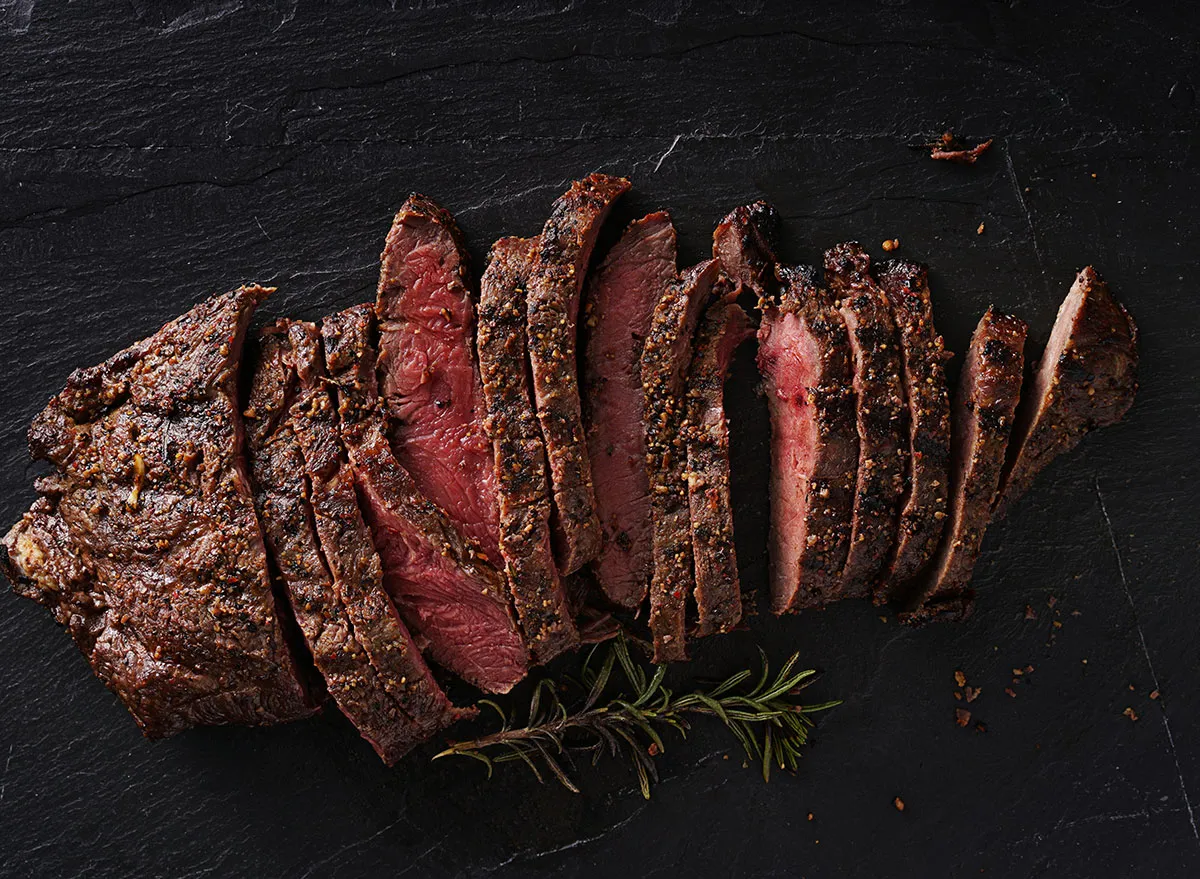
A popular steak for grilling, thanks to its tender nature and beefy flavor, flat iron steaks are unique in that the meat is interrupted by a section of tough gristle that needs to be removed. This part is inedible, but as for the rest, while this cut is lower in overall fat than others, more than half of it is saturated. It also has a pretty hefty amount of cholesterol—more than the fancy bone-in loin cuts we just mentioned. Taken from the top blade, it's also called a Boneless Top Chuck Steak.
Skirt Steak
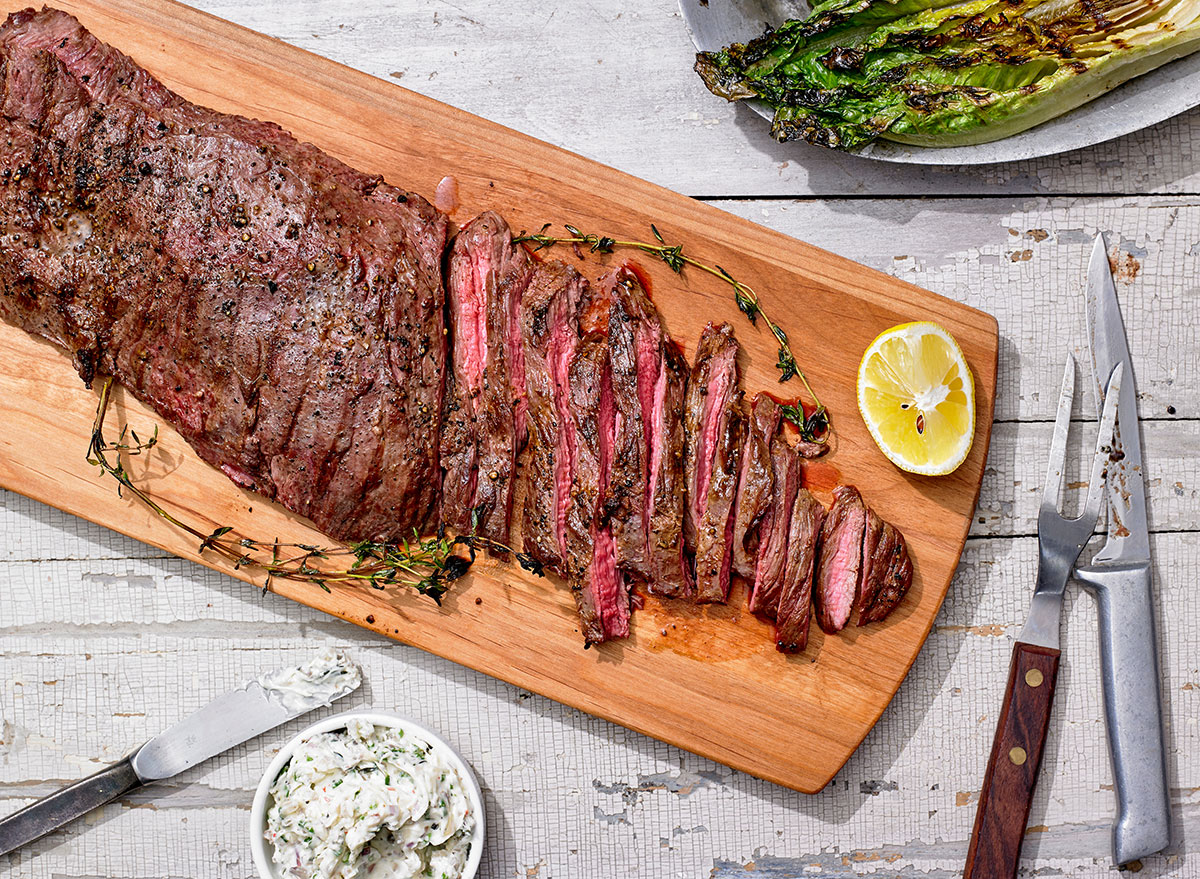
While this delicious cut impresses with only 59 milligrams of cholesterol and 3.6 grams of saturated fat—both of which are well below what the USDA defines as "lean"—its total fat does sit on the higher range, which is part of why its calorie count comes in higher. Taken from the short plate below the ribs, near where short ribs come from, you'll find this cut in fajitas and stir-fries and typically marinated. If you have a choice, ask for the inside, not outside, skirt to save 40 calories and add two grams of protein.
Hanger Steak
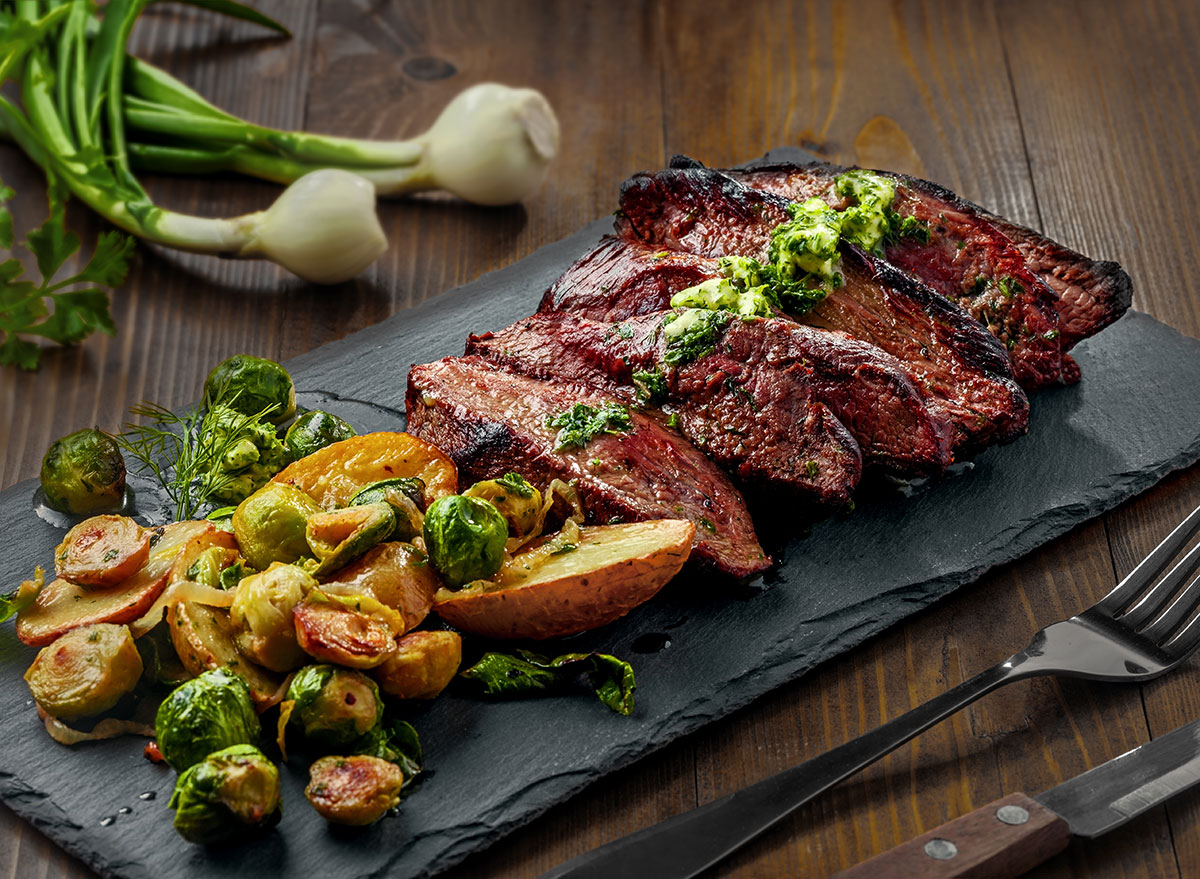
If you see an onglet or bistro steak on a menu in a French restaurant, you have a hanger. Once upon a time, the hanger steak was known as butcher's steak, because it was often kept by those pros for their own families. Other than a tough, inedible membrane, this skirt-adjacent steak does a fantastic job of imitating filet mignon, earning it a title as the second-most tender cut you can get. Best of all, with less than the limit of 4.5 grams of saturated fat and even less cholesterol than the cut it's most compared to, that's two criteria in the "lean" category, per the USDA.
Flap Steak
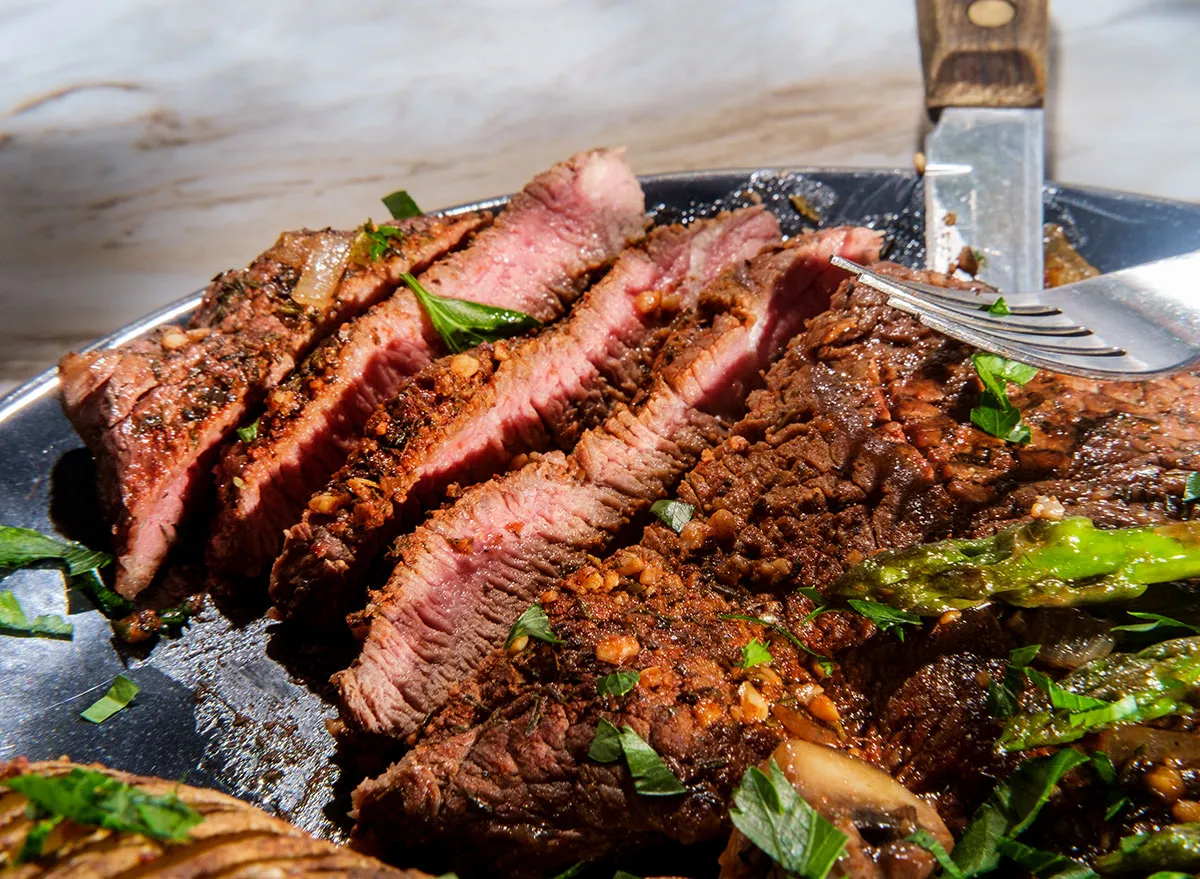
The bavette or bib steak, as it's also called, is Montgomery's favorite cut. He raves that it "eats and cooks like a mix of flank and skirt steak and is fantastic!" It offers the most amount of iron per serving—4.5 milligrams—and is sourced from the sirloin primal, which is meaty, hearty, and known to be lean. Better still, as a lesser-known cut, they're less expensive than the two cuts they resemble, as well as more tender. Nutritionally, they're fewer calories per serving and very firmly within range for USDA guidelines for lean beef. The max criteria for that is 10 grams of total fat, and this falls well short.
Filet Mignon
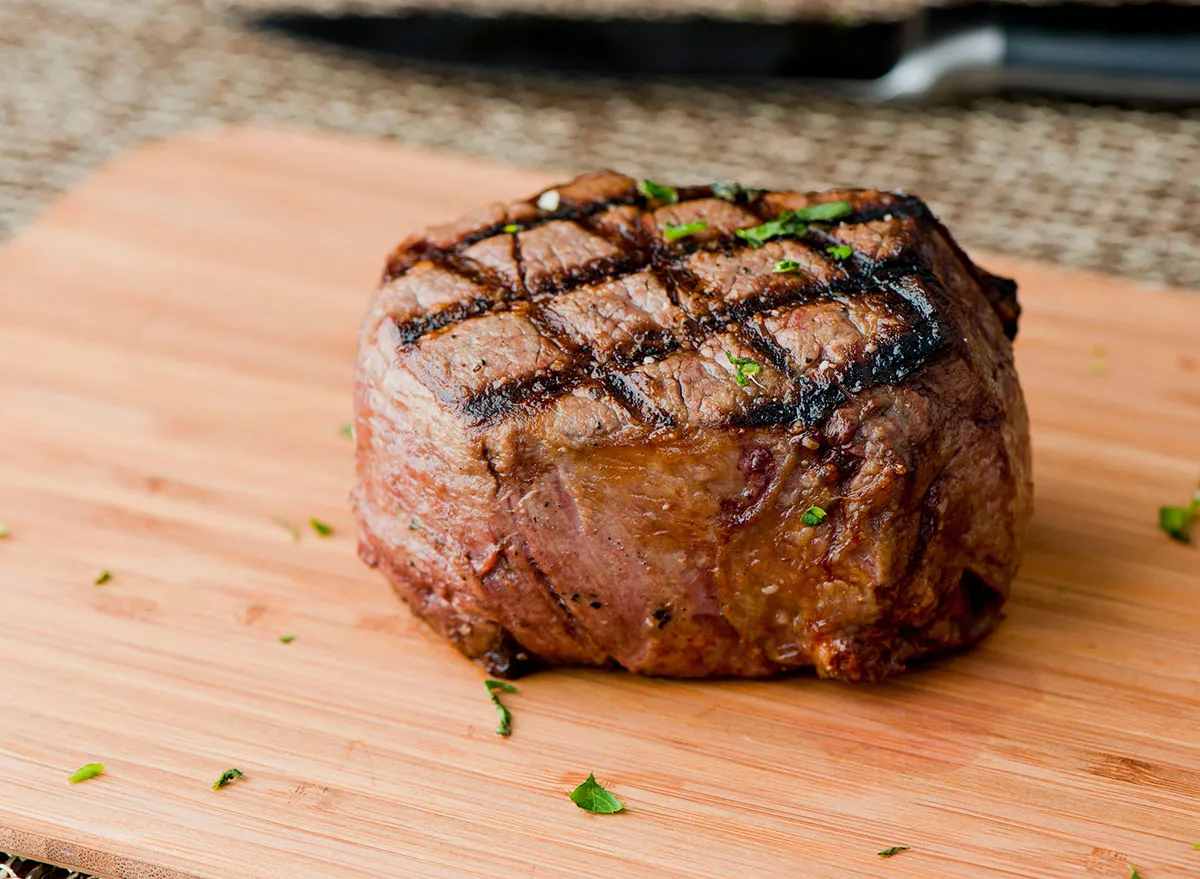
Surprised to see the beloved tenderloin in the middle and not the top of the healthy pack? So are we! One of the most well-known steaks, filet mignon is a loin cut and known for being supple, velvety, and buttery. It has little visible fat, mild flavor, and it can be so tender that you can cut with a butter knife. Because it's a little-used muscle, it's the most tender of them all. But depending on how it's trimmed, this steak with a reputation for leanness can have quite a range. Be aware that tenderloin that isn't meticulously trimmed can bump you up to 232 calories and literally double the amount of total and saturated fat per serving.
London Broil
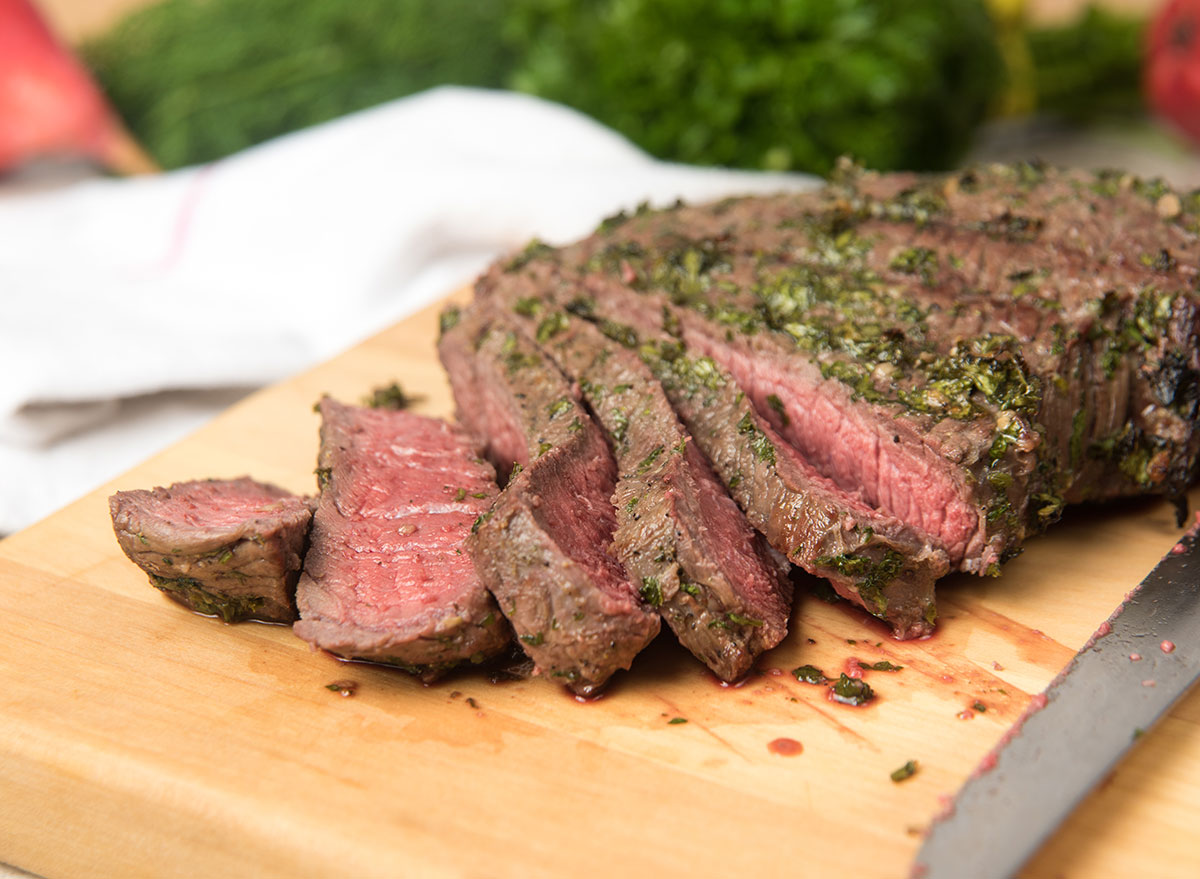
Top rounds, which are taken from right above the Eye of Round, "are really lean and therefore hard to make taste amazing," confesses Phillips. But there's no denying that its nutrition and most affordable price point is tougher to argue than any bit of its texture. This part of the cattle gets the most use as the muscles are used for locomotion, which is what makes this so low-fat and less tender. These are best treated as its name suggests—broiled—or slow-cooked.
Bottom Round Steak
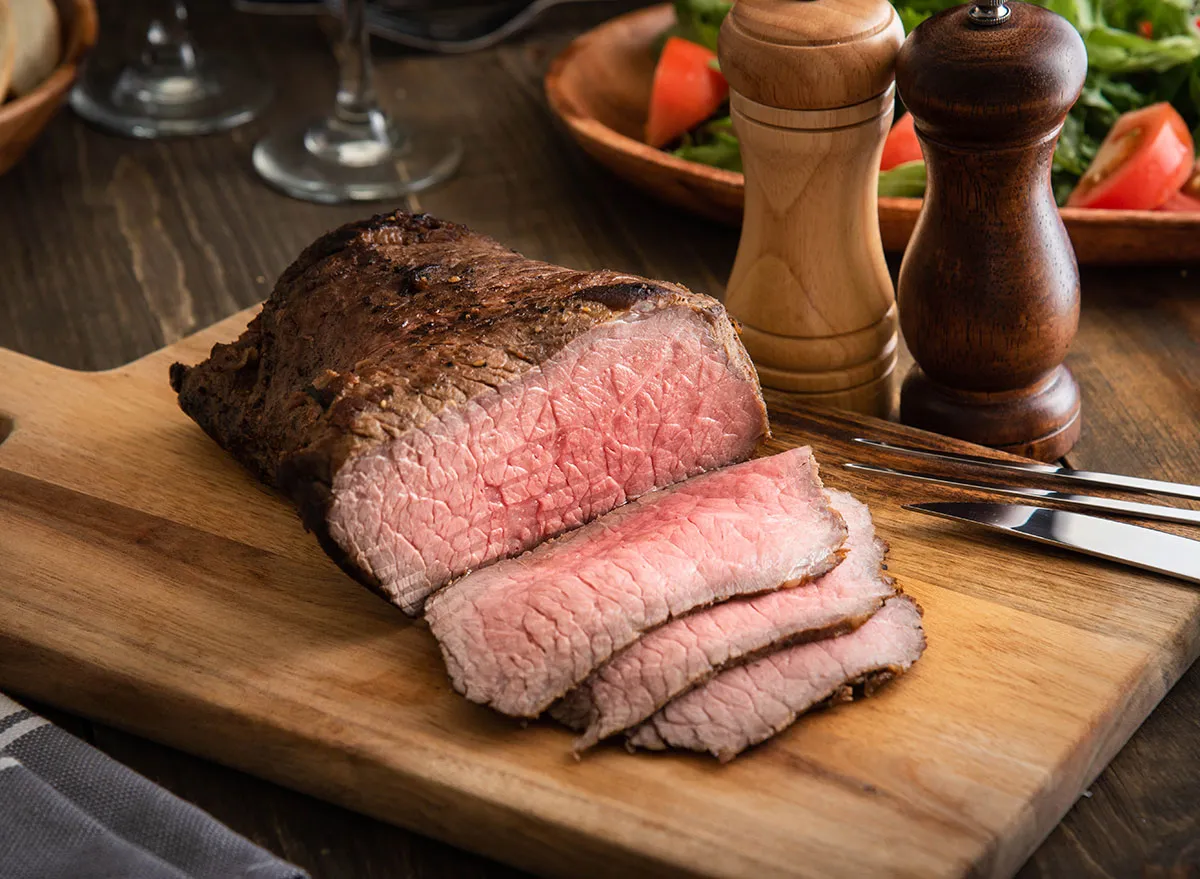
This cut may have more calories and one gram more of saturated fat than the top cut, but it packs the most powerful protein punch—more than any other on this list, as a matter of fact. On top of that, it has less cholesterol than even our best overall pick. Marinating is typically a good way to flavor up a Wester Griller or Outside Round as it may be labeled, and you can serve it by the slice family-style for a stunning and thrifty presentation.
Top Sirloin Steak
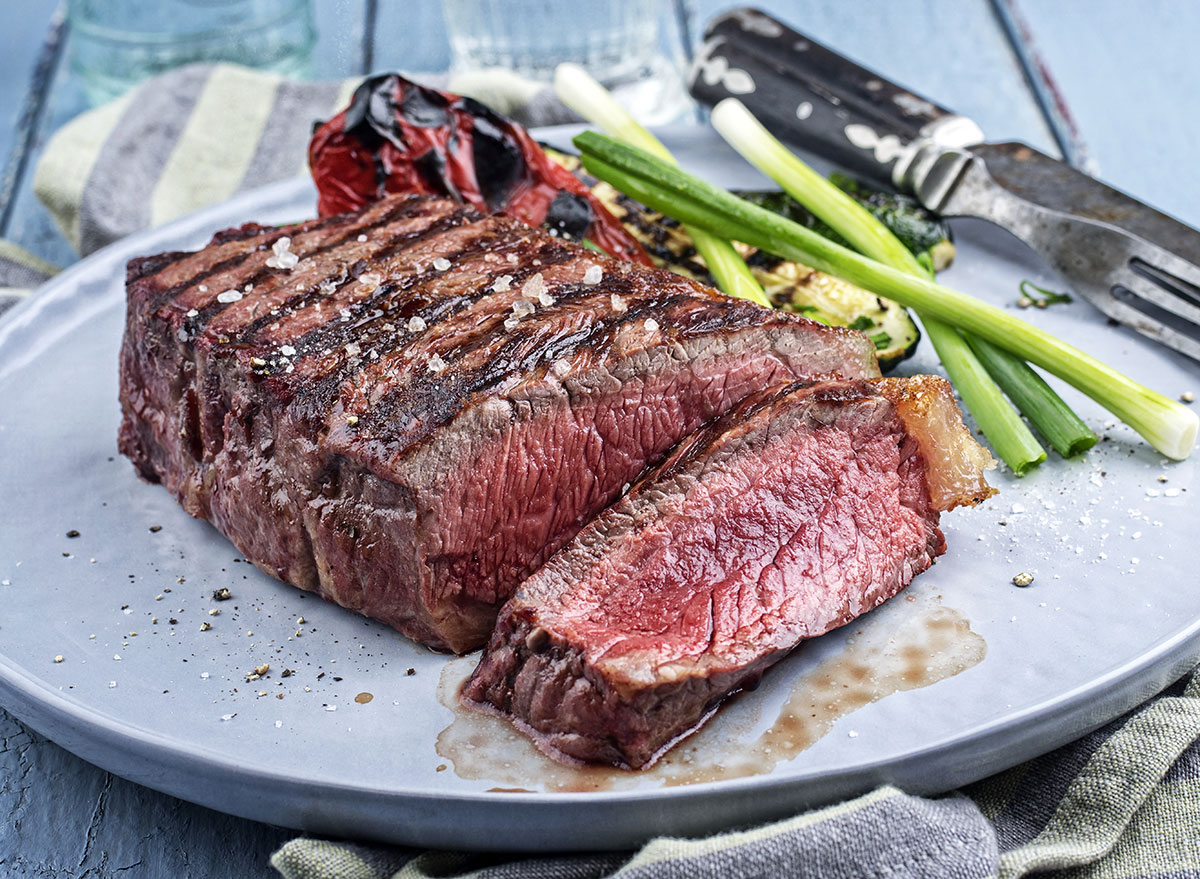
Extra-lean cuts of beef must have fewer than 5 grams of total fat, 2 grams of saturated fat, and 95 milligrams of cholesterol, and the top sirloin hits the bull's eye. Lean as it is, the center cut of this steak is actually fantastic for grilling and is often the least costly option at a steakhouse. It's the star of the sirloin and tremendously versatile. It gets even leaner when you choose the smaller top sirloin filets, which is part of the same cut, just a smaller end. Montgomery recommends trying a Wagyu breed if you feel your sirloin requires elevation—"it's one of the top leaner cuts I'd recommend," he says.
In conclusion, if you want to have a reasonably priced steak dinner either out or at home, keep your health goals in mind, and not sacrifice flavor or texture, a variation of a top sirloin steak is hands-down the best choice you can make.
No comments:
Post a Comment